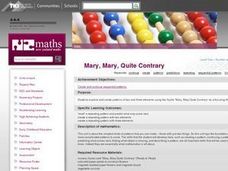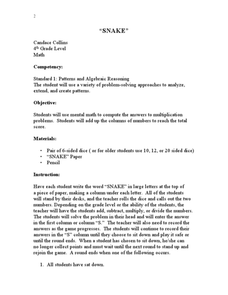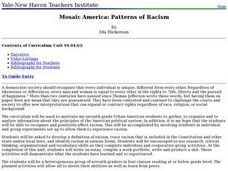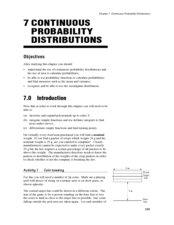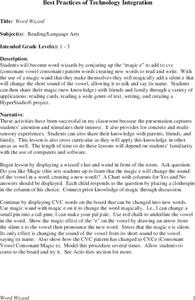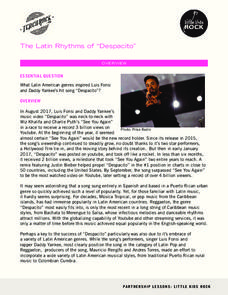Curated OER
Mary, Mary, Quite Contrary
First graders use simple vegetable cut out and colored paper flower peddles to make simple patterns. They start out with a simple 2-element patterns around the theme of a daisy and increase in difficulty.
Curated OER
Interpreting Data
For this interpreting data worksheet, students solve and complete 4 different types of problems using different data types. First, they collect raw data from a paragraph shown. Then, students identify the examples of two different types...
Curated OER
Wind Circulation, Surface Currents and Climate
Students describe connections between wind patterns, surface currents, and ocean climate zones. In small groups, they color the ocean climate zones in four different shades of blue. Students then answer questions like what four...
Curated OER
Using Tens Frames for "Teen" Numbers
Sixth graders practice recognizing teen numbers for the part-whole strategy of bridging to ten. They approach the advanced counting stage to problem solve addition facts to ten utilizing dot patterns on a quinary frame with dot patterns...
Curated OER
Math Activity: "Snake"
Fourth graders explore patterns by participating in a class math activity. In this early algebra lesson, 4th graders utilize a die and chart to keep record of a snake game in which students must utilize a math function to solve a problem...
Curated OER
Sounding out accuracy, Tic Tac Toe
Students practice word patterns while playing the game of tic tac toe. In this sounding out accuracy lesson, students work with a partner to pick a word from a pile of words. Students then sound out the word from the pile of...
Curated OER
Circles, Cylinders, Cones and Spheres
In this comparing geometric figures worksheet, students continue patterns and observe circles. In this problem solving worksheet, students answer seven questions.
Curated OER
Concepts, Patterns, Formulas, Substitution
For this algebra lesson, students define algebraic terms and rewrite them using math symbols. There are 10 problems drawing correlations to geometry as well as algebra.
Curated OER
Mosaic America: Patterns of Racism
Seventh graders use print and electronic resources to gather and analyze information on the political system in the United States. Using the Constitution, they identify and discuss instances of racism included in amendments and laws. ...
Curated OER
Pattern Puzzlers
Pupils identify triangles, circles, and squares, then show their understanding of patterns by continuing a pattern that contains three different elements. They utilize worksheets imbedded in this plan to practice using these shapes.
Curated OER
Jo's Table
Students continue a sequential pattern using a partially filled in table and simple addition exercise. They use problem solving strategies such as guess and check, make a table, look for patterns. They discuss their finding with the class.
Curated OER
Present Simple vs. Present Continuous
In this ESL verb tenses instructional activity, students examine 7 pictures and the sentences with present simple verbs. Students change the sentence to the present continuous form and choose the correct sentence from 4 choices.
Curated OER
Continuous Probability Distributions
Students practice continuous probability distributions. In this probability activity, students calculate probability, use probability functions, and use rectangular distribution.
Curated OER
Division Concept 1
In this mathematics learning exercise, 4th graders write a division sentence and a multiplication sentence for each illustration. Then they continue the patterns for the given numbers and write another division for each division problem...
Curated OER
Slither Link
In this math puzzle worksheet, students draw one continuous loop through the dots on a grid. Some areas contain a number indicating how many lines may pass by that cell.
Curated OER
Word Wizard
Students make magic wands to become word wizards who add the magic "e" to word with cvc patterns. They make reading cards, and a multimedia presentation show the use of the word patterns.
Curated OER
Patterns on a Multiplication Table
In this multiplication tables worksheet, students solve 5 problems in which a multiplication table is analyzed. Students write true or false for each statement and give an example to support each answer.
Computer Science Unplugged
Treasure Hunt—Finite-State Automata
Introduce your class to the concept of finite-state automata with an activity that asks individuals to try to map their way to Treasure Island by taking different routes though an island chain. Each island has two ship sailing...
Curated OER
Cantor Set
Discover an interesting mathematical object that your algebra learners will enjoy investigating. Their adventure will lead them to the generation of a finite geometric series.
Florida Center for Reading Research
Phonics: Varient Correspondances, Silent "e" Changes
Engage early readers in a silent e activity to help them understand the changes the letter can make to a simple word. With the provided cards, learners read and write each word as it appears without the silent e. Then they read and write...
EngageNY
Close Reading of Nasreen's Secret School: How Do People Access Books in Afghanistan?
Third graders continue to practice the close reading skills of capturing the gist and reading again for important details in the sixth lesson in a larger unit. This is a great beginning-of-the-year unit for establishing visible thinking...
Scholastic
Study Jams! Place Value
Looking at large numbers can intimidate many young mathematicians. Use Zoe's place value machine to help learners understand the meaning behind each digit in a whole number. After learning about the ones, tens, and hundreds places,...
Little Kids Rock
The Latin Rhythms of “Despacito”
When you hear the first few beats of "Despacito," the unrivaled Latin pop hit of 2017, you can't keep your feet from moving! A music analysis lesson plan examines the intoxicating hit by Luis Fonsi and Daddy Yankee and introduces the...
Curated OER
The Fibonacci Sequence
Young scholars investigate a numerical pattern and look for evidence of mathematical patterns in nature. They solve puzzles and work with a partner to predict sequential numbers in a series.
